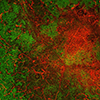
Sainsbury Laboratory Cambridge University (SLCU) has been awarded a £500,000 two-year grant from the Advanced Research + Invention Agency (ARIA) to pioneer a radical new approach in plant synthetic biology by using biological noise as a tool rather than treating it as a problem.
Co-led by Professor James Locke and Dr Chris Micklem, the project will explore how stochastic (random) gene expression can be harnessed to engineer plants that are more robust, adaptive and climate-resilient.
“Synthetic biology has traditionally aimed for precision and uniformity by suppressing randomness as a flaw,” said Professor Locke. “But in nature, randomness is not a bug, it's a feature. We're flipping the script to show that gene expression noise can actually be a powerful mechanism for controlling plant traits in ways deterministic approaches can’t achieve.”
ARIA announced today 14 R&D Creators who have been awarded seed funding in the ARIA Programmable Plants opportunity space, which is led by Programme Director Angie Burnett. Locke and Micklem’s project, "Robust plant engineering through stochastic synthetic biology," is funded as part of this Programable Plants initiative, which supports bold, high-risk research aimed at transforming how we grow and design crops.
The team’s central idea is that by engineering gene circuits that intentionally generate and leverage noise, they can program plants to display fractional, population-level behaviours like increased variability in stress responses without needing every single cell to behave identically. This stochastic approach could allow plants to better “hedge their bets” under unpredictable environmental conditions, such as heatwaves or droughts.
Appropriately tuned circuits may also enable transgene expression without the productivity and stability trade-offs that traditional synthetic biology approaches are prone to. Dr Chris Micklem, co-lead and expert in synthetic biology design and translation, added: “The capabilities that this new approach could unlock are broad: from robust engineering of plant traits, to enhanced resilience to climate instability, to low-burden bioproduction.”
Plant synthetic biology to date has taken a deterministic approach to programming plants, with attempts focusing on maximising magnitude and uniformity of expression, while minimising stochasticity. Here, a new approach is proposed, whereby stochastic expression is instead used and not suppressed: stochastic synthetic biology. Through appropriate tuning, plants can be programmed to harness noise to execute advantageous functions, such as bet hedging (amplifying variability to increase probability of survival under variable conditions, or pulsatile low-burden expression of target proteins. By implementing these stochastic synthetic biological approaches, it may be possible to unlock a new region of the phenotypic landscape, previously unreachable by deterministic synthetic biology, allowing plants to maintain productivity while increasing resilience. Graphics by Chris Micklem.
Using Arabidopsis thaliana as a model system, the team will design gene circuits that generate tuneable pulses of activity and variability across plants. Once established, these circuits will be tested for their ability to enhance traits like thermotolerance and drought resistance, with a view to eventual industrial translation. “What makes ARIA so special is not only their support for highly ambitious research, but their drive for this to solve major challenges facing the planet – the explicit intention is for this work to have real-world impact and that is extremely exciting.” said Dr Micklem.
The project will be executed through iterative design-build-test-learn cycles, combining single-cell imaging, synthetic gene network modelling, and advanced genome engineering techniques.
This marks a major step in developing what the team calls "stochastic synthetic biology". This is a paradigm shift that could expand the design space of plant engineering beyond current deterministic limits.
“There’s enormous untapped potential in the noisy, messy dynamics of real biological systems,” said Professor Locke. “With this project, we aim to not only prove that it can be done, but to inspire a new direction for the field.”
The research draws on the team’s previous work on stochastic gene regulation in microbes and plants and brings together interdisciplinary expertise in modelling, engineering, and translation.
About ARIA
ARIA is an R&D funding agency created to unlock technological breakthroughs that benefit everyone. Created by an Act of Parliament and sponsored by the Department for Science, Innovation and Technology, ARIA funds teams of scientists and engineers to pursue research at the edge of what is scientifically and technologically possible






